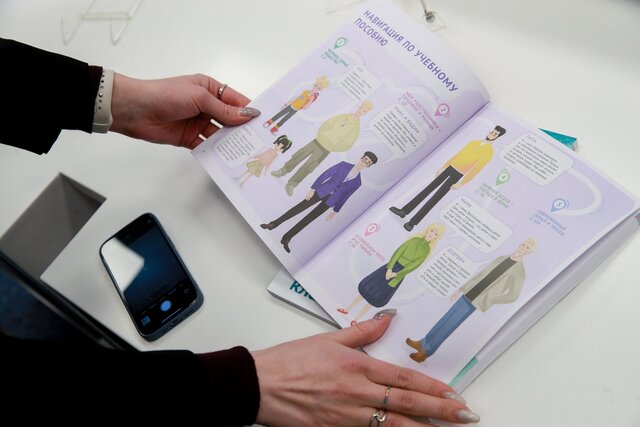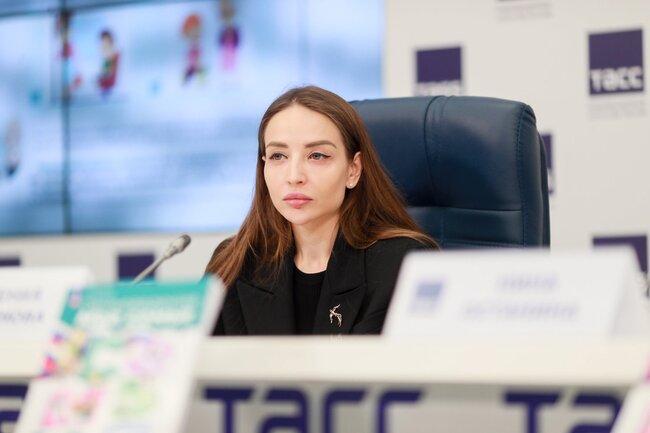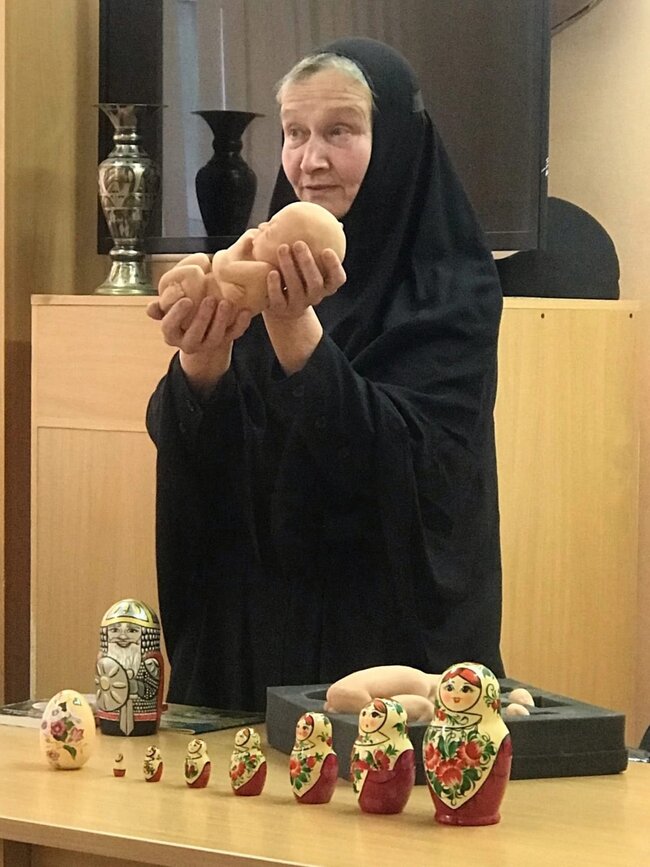'The seven faces of femininity'. Russia is preparing to roll out its reactionary 'family studies' curriculum to schools nationwide. Here's what's in it.
Manage episode 481718221 series 3381925

Schooling in Russia continues to grow more politicized. On the one hand, there’s a strong emphasis on patriotism: in the Education Ministry’s “patriotic” lesson series, Important Conversations, the curriculum focuses on “love for the motherland"; in some schools, children write letters to soldiers, learn to march, and even operate drones. On the other hand, schools are giving increasing attention to family values and “traditional" upbringing. With new restrictions on "childfree propaganda," large families with numerous children are now presented as a national ideal.
In the 2024–2025 academic year, some regions began piloting a new subject called “family studies" — and starting next year, it’s set to be introduced nationwide. The course aims to prepare boys to become Russia’s future warriors and “defenders,” while its messages for girls are focused on family and motherhood. Novaya Gazeta Europe took a look at how Russia is weaving "traditional values" into its school curriculum, what teachers are saying in classrooms, and what parents think about the changes. Meduza shares an English-language version of their report.
‘Family studies’ from occultists
Starting next school year, all schools in Russia will offer a new extracurricular course called "family studies." According to its official description, the course is designed to instill in young people a "commitment to traditional Russian spiritual and moral values — including the value of a strong family — that reinforce civic unity in Russian society and is geared toward addressing the country’s demographic challenges.” The subject is already being piloted in 42 regions.
The State Duma’s Committee on Family Protection developed the course's textbook — but problems arose almost immediately. Orthodox priest Pavel Ostrovsky has pointed out that one of the co-authors is Ksenia Mosunova, a practitioner of "rodology," a pseudoscience claiming to decode ancestral influence on behavior. On her blog, Mosunova talks about “genes of poverty and greed” and charges up to a million rubles (about $12,000) for consultations on “hereditary behavioral scripts.” She claims to be a junior researcher at Kosygin State University and founded the Institute of Contemporary Psychology and Genealogy (ISPiR), which has only one staff member (most likely, her).

Senator Andrei Klishas called the textbook’s authors “science denialists,” while conservative activist Ekaterina Mizulina, head of the Safe Internet League, said, “When school textbooks are written by people who talk about ‘postponing your date of death’ or a ‘poverty gene,’ that’s not just nonsense — it’s a provocation.”
The textbook for grades 5–9 covers topics like generational continuity and the benefits of having a large family, telling students: “The more of us there are, the stronger we are.” There’s a chapter on the honorary title “Mother Heroine” — awarded to mothers of 10 or more children — and on how families should raise “patriots.”
Predictably, the roles of mother and father are defined in traditional terms. According to the book, a mother provides emotional support, helps the child grow and set boundaries, and shapes their self-esteem. The father, in addition to supporting the family, protects it, serves as an authority figure, and helps children build practical skills. One chapter explores masculinity and femininity as portrayed in art and literature: “Masculinity in books and fairy tales is often shown as strength, bravery, and the desire to protect and help others. Femininity, meanwhile, is shown as gentleness, care, wisdom, and the ability to nurture.”
Naturally, the textbook states that the purpose of marriage is to have children and that the government supports young families. The course also teaches students to support their relatives, resolve conflicts through dialogue, and respect personal boundaries. Other sections cover financial literacy and household management.
Russia's anti-abortion turn
The themes of family and motherhood are already regularly addressed in the Important Conversations class. Last year, themed lessons were timed to coincide with Mother’s Day and Father’s Day. Students were read a quote from Vladimir Putin: “A strong and loving family with happy children is Russia’s future.” Teachers were required to remind students that in Russia, a family is defined as “a union between a man and a woman, a mother and father.”
In March 2025, high school students were shown a segment from a TV program by filmmaker Nikita Mikhalkov in which he laments that “destroying the family in Russia means destroying Russia itself.” Before showing the video, teachers were instructed to tell students that caring for family and children has always been — and remains — “one of a woman’s primary responsibilities.” After the screening, students were asked to discuss how motherhood is connected to the transfer of traditions from one generation to the next.
‘The eternal figure of the matryoshka’
Several teachers who left their jobs at various times after the start of the full-scale war told Novaya Gazeta that their schools hadn’t featured much messaging aimed specifically at girls. “Things were operating in war mode, so demographics hadn't become the priority yet,” one former teacher said. Recently, however, some regions have held themed events targeting female students.
In April, for example, schools and colleges across the Tyumen region held lectures on “moral behavior in relationships" in which girls were warned against premarital sex, cohabitation, abortion, and contraception. At the end of one session, Alyona Stolichnaya, a member of the Sochi Public Chamber, advised girls to “protect their purity,” find true love, and marry someone they’d be happy to have children with. “Any relationship that doesn’t lead to a deep, joyful, and lasting union is just a surrogate experience that brings only pain,” she said.
In Tatarstan, children attended a lesson on fidelity, chastity, and “the value of life before birth.” They were shown videos about fetal development and given a lecture on the difference between love and infatuation. “True love is born within the family, and children — especially in large numbers — help make that happen. A large family isn’t just support for parents in old age; it also means more loved ones within the family, and a stronger nation,” said Elina Belyankina, president of the Umileniye Center.
In the Khanty-Mansiysk region, high school girls were lectured about the importance of chastity, the value of starting a family, and the need to avoid early sexual activity and abortion. In Perm Krai, a former OB-GYN — now a nun named Elisaveta — gave a talk titled Orthodox Culture as the Guardian of Chastity and Health.
According to a report by the Perm branch of the Union of Orthodox Women, the nun discussed puberty and the roles of men and women “from the perspective of Christian anthropology and traditional Russian culture,” and addressed "national scourges such as abortion and foul language."

To drive the point home, the speaker used plastic fetus models and matryoshka dolls. “The seven faces of femininity were revealed through the familiar and eternal figure of the matryoshka, allowing everyone present to try on each feminine role — from daughter to grandmother,” the Union’s report stated.
Occasionally, though, these sessions take a surprisingly progressive turn. In the Saratov region, for instance, a doctor was invited to speak to students under the title Wanted Children — at the Desired Time. She discussed the importance of contraception, reproductive health, and STIs. Her main message was that pregnancies should be planned and that women shouldn’t give birth before the age of 20.
‘A fall from grace’
Official curriculum can differ from what actually happens in schools, says Olga (name changed for security reasons), the mother of a high school student in St. Petersburg. Her school’s social media is filled with patriotic content, but in reality, she says, students mostly use Important Conversations to make up for failing grades in other subjects.
While Olga maintains that there’s no systematic pressure on girls regarding their roles as women, she says that some teachers follow the spirit of the times, and she’s noticed changes over the past two years. In a social studies class, for instance, students were asked to write essays arguing that abortion is murder.
“They wrote about how it’s a fall from grace, how horrific it is. That a girl who has an abortion loses her moral worth as a person. Then they showed a cartoon about abortion, making it clear that it’s murder and must never be done,” Olga recalls.
In her daughter’s class, students were told that the number of children in a family should be determined by the man — and if he wants to be a father, his wife has an obligation to make that happen.
“Right before International Women’s Day, they were told that a woman realizes her value by becoming a mother and wife. That if she hasn’t married or had kids, she hasn’t developed as a person… Our teachers are split. Some are supportive of the kids, and then there are others like this,” Olga says.
Outlawing abortion without new laws
When her daughter criticized patriarchal norms in a literature class essay, the piece received an A — but was pulled from an inter-school competition. “The literature teacher told me that it’s just not comme il faut to write things like that now,” Olga explains.
She recalls how during Maslenitsa, the girls in her daughter's class made pancakes while the boys just stood around — because men supposedly shouldn’t cook. Last year, in home economics, boys studied tech, while the girls learned to sew aprons. In English class, boys wrote essays about science and history, while girls wrote about cooking, fashion, beauty, and childrearing.
“They’re training the girls to be support staff! Again, there’s no official directive — it’s happening bit by bit, in certain lessons. A teacher might say something like, ‘You don’t really need to go to university; you’ll end up having kids anyway.’ I think they’re getting messaging from above, and some manage to dodge it — but others don’t,” Olga says.
The 17 values of Vladimir Putin
Irina (name changed for safety reasons), a social studies teacher from a “small provincial town in Siberia,” says the full rollout of the new 'family studies' curriculum is coming next year. For now, her region is still focused primarily on “military-patriotic” education, and girls aren’t being specifically targeted.
Still, schools occasionally receive instructions to participate in events like parades for Russia’s Day of Family, Love, and Fidelity. Class discussions are also expected to be based on “Russia’s 17 values” outlined by Vladimir Putin. The main message, Irina explains, is that the ideal family is “traditional and has many children.”
Teachers are cautious when it comes to discussing gender and relationships, fearing complaints from parents. But some, she says, go as far as telling girls outright that getting married and having children is their life’s purpose.
“I personally use class time to talk to kids about personal boundaries and the right to say no,” Irina says. “Unfortunately, we haven’t had proper training sessions or debates in a long time — no open conversations about relationships between kids and adults, boys and girls.”
She worries about the impact this messaging is having on the girls in her classes — many of whom are talented and ambitious. The pressure to conform to “traditional values,” she says, can be deeply damaging.
“Some of them already feel like there’s something wrong with them just because they want a career or personal growth instead of marriage,” Irina says. “I believe this will have long-term negative consequences — both for individuals and for society as a whole.”
Original story by Artur Valentinov for Novaya Gazeta Europe
64 episodes



